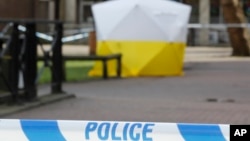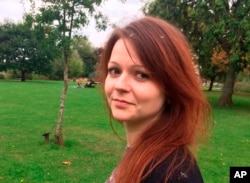Four laboratories linked to the international chemical weapons watchdog have confirmed Britain's findings that a nerve agent was used last month to poison a former Russian spy and his daughter.
The confirmations were in an Organization for the Prohibition of Chemical Weapons (OPCW) report released Thursday.
British Ambassador to the U.N. Karen Pierce said OPCW's conclusions "agree explicitly with the U.K.'s analysis" and added the chemical used in the attack was a "military-grade nerve agent of high purity."
British Prime Minister Theresa May said former Russian spy Sergei Skripal and his daughter, Yulia, were poisoned last month in Salisbury, England with a military-grade nerve agent developed by the Soviet Union in the 1970s and '80s.
The watchdog did not blame Russia for the attack nor did it name the specific chemical agent used. But British Foreign Minister Boris Johnson said only Russia had the "means, motive, and record" to carry out such an attack.
Russia has denied involvement in the attack and contends Britain has not provided evidence to support its allegation.
Russian Foreign Ministry spokeswoman Maria Zakharova said Thursday Russia would not accept any of the report's conclusions unless Russian officials were provided access to the ongoing investigation. Zakharova also accused Britain of waging a campaign to discredit Russia.
"We are all simply drowning in a torrent of misinformation that is in one way or another supported by official London," she told reporters. "There are no grounds to believe that all of this is not the continuation of a crude provocation against the Russian Federation on the part of the British special services."
Britain, meanwhile, has called on the U.N. Security Council to convene a meeting to discuss the report, according to a tweet from Britain's mission to the United Nations.
Ambassador Pierce said it would probably be held next Wednesday.
Yulia Skripal was discharged Monday from a British hospital. She said she was still suffering from the effects of the poisoning and her father remains seriously ill.
She lives in Russia but was visiting her father in Britain when they were poisoned. In a statement issued Wednesday night by Britain's Metropolitan Police Service that was attributed to her, she rejected an offer of assistance from the Russian Embassy. Zakharova reiterated that British officials were keeping Yulia Skripal in isolation and said Moscow would continue to demand access to her.






